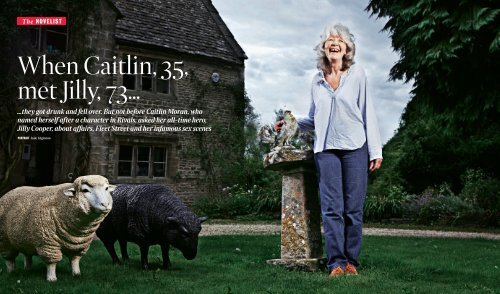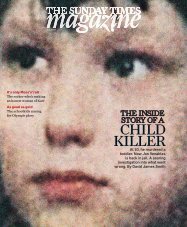When Caitlin, 35, met Jilly, 73⦠- Press Awards
When Caitlin, 35, met Jilly, 73⦠- Press Awards
When Caitlin, 35, met Jilly, 73⦠- Press Awards
Create successful ePaper yourself
Turn your PDF publications into a flip-book with our unique Google optimized e-Paper software.
The NOVELIST<br />
<strong>When</strong> <strong>Caitlin</strong>, <strong>35</strong>,<br />
<strong>met</strong> <strong>Jilly</strong>, 73…<br />
…they got drunk and fell over. But not before <strong>Caitlin</strong> Moran, who<br />
named herself after a character in Rivals, asked her all-time hero,<br />
<strong>Jilly</strong> Cooper, about affairs, Fleet Street and her infamous sex scenes<br />
PORTRAIT Jude Edginton<br />
36<br />
PAGE XX 11 September 2010<br />
11 September 2010<br />
ttm11036 1-2 06/09/2010 12:20<br />
PAGE 37
This is where Rupert<br />
Campbell-Black was<br />
playing tennis, naked,<br />
when he first meets<br />
Taggie,” <strong>Jilly</strong> Cooper says.<br />
It’s an overcast day<br />
in Gloucestershire, and<br />
we’re standing on a soggy<br />
lawn, taking a tour of<br />
Cooper’s wisteria-fringed house and gardens.<br />
She is holding a bottle of champagne.<br />
Our glasses are half-full. We’re both a bit<br />
staggery: we’ve been on the sauce since<br />
1pm, didn’t bother much with lunch, and it’s<br />
now gone four. I’ve missed two trains, urged<br />
to ignore their departure by Cooper howling,<br />
“Oh, do stay. We need more gossip!”<br />
On our way down the hall, Cooper<br />
bumps gently off the wall. “Whoops!” she<br />
hoots, veering to the left, then bumping<br />
off the opposite wall. “I’m a bit tight!”<br />
We are combining the “more gossip”<br />
with sightseeing around Cooper’s grounds,<br />
which double – as anyone who has read her<br />
legendarily filthy novels will know – as<br />
the setting for her fictional “Rutshire” canon.<br />
Cooper’s house is Rupert Campbell-Black’s.<br />
To the right is the Bluebell Wood, where<br />
Billy first rolled around with Janey in the<br />
wet nettles. And this tennis court is, indeed,<br />
where Campbell-Black – for many women,<br />
a literary hero the equal of Mr Darcy – played<br />
mixed doubles in the knack. (“Cock fault! You<br />
must be at least ten inches over the line!”)<br />
I am, essentially, being given a dirty tour<br />
of Bath by a pissed Jane Austen.<br />
As this is a once-in-a-lifetime opportunity,<br />
I feel I must tell Cooper my thesis on her<br />
legendary output. I’ve long had the theory<br />
that Riders – the incendiary 1985 book that<br />
launched the whole Rutshire series; current<br />
sales: more than 15 million – must have been<br />
the result of a blazing hot affair. Cooper had<br />
just moved from London to Gloucestershire,<br />
and fallen in with a set – Andrew Parker<br />
Bowles; Michael, Earl of Suffolk; Rupert<br />
Lycett Green; the Duke of Beaufort – that she,<br />
in later years, described as “wildly dashing and<br />
exciting”. Indeed, in 2002, she admitted that<br />
swaggering, sexy Campbell-Black was<br />
conceived as an amalgam of all four of them.<br />
She must have been shagging one of<br />
them, I surmised. Riders is a book written by<br />
someone ablaze with desire – written with the<br />
born-again ardour of someone coming alive<br />
for the second time. Come on! It’s obvious!<br />
“Were you having an affair?” I ask her,<br />
gently wobbling in the breeze. There is a<br />
pause. Cooper looks out across the pale,<br />
rainy valley – she’s now 73, but with the same<br />
pale fluff of hair and fox-like eyes she had<br />
at <strong>35</strong>, when she was the hot young Sunday<br />
Times columnist, racketing around Fleet<br />
Street in a miniskirt, playing table tennis<br />
‘People weren’t worried<br />
about sex. We had<br />
contraception, no Aids.<br />
It was joyful, exploratory’<br />
with Melvyn Bragg in a see-through dress,<br />
and kissing Sean Connery in the hallway.<br />
“I just fell in love with the countryside,”<br />
Cooper says, eventually, looking out across<br />
the landscape. “That was what made me come<br />
alive. I was having an affair with the whole of<br />
the Cotswolds. Leo [her husband] stayed in<br />
London at the time, and I moved here, and<br />
everyone said: ‘Oh, if you move to the country,<br />
you’ll get in trouble.’ But I never did. It was<br />
the impact of the country. The liberation.”<br />
We stand in the rain a while, looking at<br />
the wet beeches. Then Cooper looks down<br />
at the champagne bottle in her hand. “Oh,<br />
it’s empty,” she says, disconsolately. There<br />
is a pause. Then: “We must open another!”<br />
For a generation of women – my generation<br />
– <strong>Jilly</strong> Cooper is totemic: a combination of<br />
role model and storyteller who made being<br />
As a Sunday Times<br />
writer in the Seventies<br />
The NOVELIST<br />
a woman seem like fun. Her columns<br />
in The Sunday Times were, at the time,<br />
revolutionary: the novel ruse of getting<br />
a woman to write humorously about<br />
her domestic, <strong>met</strong>ropolitan life.<br />
She goes to jumble sales, walks the<br />
dogs, gets squiffy at dinner parties, gets<br />
squiffy on sports day, boggles over the newly<br />
published Hite Report (“The <strong>met</strong>hod of orgasm<br />
achievement is rather quaint: ‘I bang my mons<br />
against the sink,’ said one housewife”), frets<br />
about her weight (“Who wants to be 8st 5<br />
if they look like a flat-chested weasel?”), finds<br />
out she’s infertile and adopts two children<br />
with breezy can-do-ness, and confesses<br />
all of her most inappropriate thoughts (“One<br />
of the compensations of getting old is flirting<br />
with friends’ offspring. I quite fancy myself<br />
as the ‘close bosom friend of a maturing<br />
son’”) with both self-deprecation and a<br />
winning, underlying confidence. Ultimately,<br />
she doesn’t really care what anyone thinks,<br />
because she’s having such a hoot.<br />
Where all the female columnists of the<br />
21st century – and, indeed, eventually, Helen<br />
Fielding’s Bridget Jones – tread now, Cooper<br />
trod, slightly unsteadily at first. With a few<br />
tweaks here and there (references to “blacks”,<br />
slight wobbliness when it comes to gays),<br />
you could run any of her Seventies columns<br />
today and they wouldn’t have dated at all.<br />
But Cooper claims she never intended to be<br />
a writer. “Well, I just thought I’d get married<br />
and have children,” she says, settling into<br />
an armchair. It’s earlier in the day – we<br />
haven’t opened the champagne yet.<br />
We’re in a drawing room – shabby,<br />
warm, plant-filled, with almost every nook<br />
and cranny taken up with animalalia: china<br />
dogs, a stuffed badger, cushions with pictures<br />
of late pets. Cooper is a renowned defender<br />
of animal rights. She was one of the major<br />
fundraisers for the gigantic Animals in<br />
War memorial on Park Lane, London.<br />
“I didn’t have any idea of a career,” she<br />
continues. Cooper applied for Oxford having<br />
flunked her A levels, and instead sat its<br />
entrance exam. She failed that too in a blaze<br />
of typical behaviour. “I hit Oxford and went<br />
berserk,” she beams. “I went to parties every<br />
single night. It was the first time I’d ever had<br />
a drink. One of the graduates had to carry<br />
me home, like a coffin – it was so funny.”<br />
Hungover at the interview, Cooper was<br />
turned down flat. Her parents – an Army<br />
brigadier and his “nervous” wife – were<br />
heartbroken. “But I’m rather glad I didn’t go,”<br />
Cooper says with her trademark cheerfulness.<br />
“I’m glad I’m not academic. I would probably<br />
have gone on to write boring biographies.”<br />
That, of course, is exactly what didn’t<br />
happen. For in 1985 Cooper progressed<br />
from Fleet Street columns (bagged when<br />
she amused the Sunday Times editor at<br />
The Times Magazine 39<br />
11 September 2010<br />
PAGE 39<br />
ttm11039 3 06/09/2010 15:25
PETER ROSENBAUM/SCOPE FEATURES<br />
a dinner party) to her first big novel, Riders.<br />
It was so risqué that her bank manager asked<br />
Leo, in horror, “How does <strong>Jilly</strong> know about<br />
such things?” “Showjumpers are not like<br />
this,” Horse & Hound thundered.<br />
“I read it now and my hair stands on end,”<br />
Cooper says, looking scandalised by herself<br />
– but also, to be fair, looking like she’s greatly<br />
enjoying being scandalised by herself as well.<br />
“Blowjobs! There’s blowjobs everywhere.<br />
I remember my editor saying: ‘Darling, do<br />
you think you should have this bit about<br />
sperm trickling down the thigh?’ I mean,<br />
it’s not nice. But we were in this little pocket<br />
– from the Sixties to the mid-Eighties – where<br />
people weren’t worried about sex. We had<br />
contraception, it was before Aids; it was joyful<br />
and exploratory. We were a young couple –<br />
the Coopers. We had a lot of people asking us<br />
to go to bed with them. Although we didn’t!”<br />
This can-do-you attitude feeds into the<br />
books, which – much like those of her rival of<br />
the time, Jackie Collins – are full of enjoyably<br />
diva-ish characters landing on the lawns of<br />
their mansions in helicopters, ordering crates<br />
of Dom Pérignon, then rutting all night long.<br />
Unlike Collins’, however, Cooper’s books<br />
are unmistakably British, and all the better<br />
for it: people crack puns mid-coitus, there<br />
are breathless descriptions of herbaceous<br />
borders and darling spaniels, and there’s an<br />
air of uplifting jolliness to the whole thing,<br />
which makes sex seem like a total hoot.<br />
Pre-internet, this was how most women<br />
of my generation learnt about sex. Get any<br />
group of thirtyso<strong>met</strong>hing women together<br />
now, and the chances are that, after a couple<br />
of cocktails, they can still quote the filthy bits<br />
from Riders, Rivals, Polo, The Man Who Made<br />
Husbands Jealous and Pandora word for word.<br />
Cooper’s Rutshire was the world we escaped<br />
to as teenagers. It was Sex Narnia. <strong>When</strong> I<br />
needed a nom de plume for writing, I named<br />
myself after one of the characters in Rivals, for<br />
goodness’ sake. Without Cooper, I would still<br />
be plain old Catherine Moran.<br />
It’s fitting, then, to discover why Cooper<br />
has such an affinity with the escapist desires<br />
of teenage girls: as a teenage girl, she had<br />
some escaping to do herself. Becoming<br />
distressed at the mention of it – her hands<br />
start to fly around, like birds – she mentions<br />
how terribly “anxious” her mother would<br />
get every time they had to move house to<br />
follow Cooper’s father from Army posting to<br />
posting. So<strong>met</strong>imes, her mother would have<br />
to “go away” for a while – to hospital – to<br />
recover. <strong>When</strong> Cooper went away herself,<br />
to an all-girls boarding school, she left<br />
early, having told her parents she was<br />
“dying of emotional anaemia”.<br />
I suspect it was around this time that<br />
Cooper began to develop her characteristic<br />
life-long cheerfulness, the kind of merriness<br />
<strong>Jilly</strong> and Leo still light<br />
up around each other.<br />
There’s a teenage air to<br />
their teasy conversations<br />
that has its roots in a steely determination not<br />
to give in to melancholy or despair, because<br />
the consequences of that are known all too<br />
well. I wonder if it’s also Cooper’s upbringing<br />
that triggered her other notable trait: an oftproclaimed<br />
unwillingness to be a writer.<br />
In a corner of the drawing room, on<br />
a chair, sits a rackety old manual typewriter<br />
called Monica. Cooper wrote every single<br />
one of her books on Monica, including her<br />
latest, Jump!. I ask her if she feels happiest<br />
behind her typewriter, in control of her<br />
world, as you would expect from someone<br />
who’s been writing for 41 years.<br />
“Goodness, no!” Cooper says, horrified.<br />
“I’m awful when I’m writing a book. My<br />
editors and agents are always so lovely, but<br />
I take for ever, and there’s always a point<br />
where I think I can’t finish it, and I stretch<br />
the deadline and stretch the deadline, and<br />
they worry they won’t ever see it at all,<br />
and I struggle terribly. Terribly.”<br />
She says she was forced to start writing<br />
Rivals “because we’d lost all our money.<br />
I was terribly worried about money”, and that<br />
she still writes now out of financial necessity:<br />
the upkeep of the house and, increasingly, the<br />
cost of care for Leo, who has Parkinson’s.<br />
I <strong>met</strong> Leo earlier. He has a nookish,<br />
book-lined office, cheerfully insists, “You must<br />
smoke if you want to smoke. I believe in that,”<br />
and has a wheelchair he lets me sit in while<br />
I drink my tea. He and Cooper are clearly<br />
very fond of each other – they still light up<br />
With Leo, her husband<br />
of 49 years, who now<br />
suffers from Parkinson’s<br />
The NOVELIST<br />
around each other, after 49 years of<br />
marriage, and there’s an almost teenage air<br />
to their teasy, nudging conversations. Cooper<br />
recently had a health setback herself: a<br />
stroke, although minor. As she perches on<br />
Leo’s desk, a small but still livid scar from<br />
a subsequent operation is apparent; the<br />
only visible consequence, it seems. One’s<br />
first instinct might be to pity this 73-yearold<br />
woman with a scar on her neck, still<br />
forced to write gigantic blockbuster novels<br />
in order to keep the family afloat.<br />
But as we repair to the kitchen, get stuck<br />
into the champagne and start a gossip session<br />
that is never less than 100 per cent libellous<br />
(“So has [big name Fleet Street columnist]<br />
gone completely mad? And you know, of<br />
course, that [huge political figure] was having<br />
an affair with [another huge political figure]?”),<br />
and Cooper talks about writing, and the<br />
media, with the passion of a master of<br />
her craft – someone with the whole awful,<br />
drunken, amazing, ridiculous industry in their<br />
blood – a suspicion starts to form in my mind.<br />
Finally – as we open the third bottle<br />
of wine, over the laughably untouched<br />
quiche and salad – I trot it out.<br />
“I think that, secretly, you’re glad your<br />
financial situation means you have to keep<br />
writing,” I say, unsteadily pushing my glass<br />
towards Cooper’s equally unsteady bottle.<br />
“Because if you didn’t have to write, you would<br />
never have had the excuse to go and lock<br />
yourself in your room with your typewriter<br />
in 1969, and just sit down and write. I think<br />
women writers almost always need an excuse<br />
to indulge in the selfishness of creativity.<br />
I think when you started, the only way<br />
you could ever have said, ‘Go away –<br />
Mummy has to write now,’ is if it were<br />
from dire financial need. And you still feel<br />
that you need that excuse now, even though<br />
you’re 73 and have sold 15 million books.”<br />
Cooper stares at me for a moment,<br />
wine-ishly. “You’re quite right,” she says,<br />
finally. “Brilliant. Brilliant. You’re quite right.<br />
It’s absolutely true about that, isn’t it? It is<br />
self-gratification, isn’t it? You’re so right.<br />
So right. More wine?”<br />
<strong>When</strong> I finally pour myself onto a train,<br />
an hour later, I spend the first half of the<br />
journey gloating that I’ve cracked the essential<br />
conundrum at the heart of one of my all-time<br />
heroes. God, I’m great. I’ve totally nailed it.<br />
Look at me, with my insights.<br />
Around Reading, however, it occurs to<br />
me that <strong>Jilly</strong> Cooper is so lovely, and was so<br />
tipsy, she would probably have said anything<br />
at that point to get me out of her kitchen. ■<br />
Jump! by <strong>Jilly</strong> Cooper is published by Bantam<br />
<strong>Press</strong> on Thursday and is available from The<br />
Times Bookshop priced £16.99 (RRP £18.99),<br />
free p&p: 0845 2712134; thetimes.co.uk/bookshop<br />
The Times Magazine 41<br />
11 September 2010<br />
PAGE 41<br />
ttm11041 4 06/09/2010 12:22






